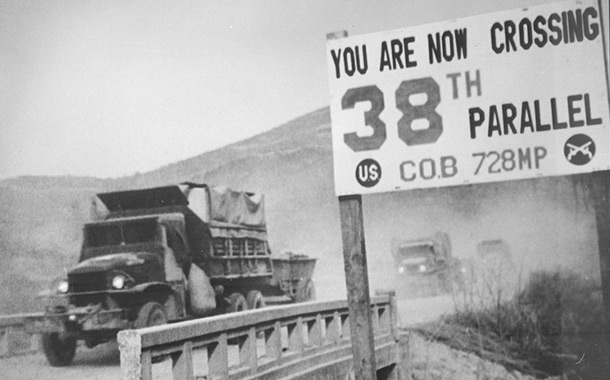<![CDATA[On 9th October 1950, United Nations forces crossed the 38th Parallel near Kaesong, and entered North Korea for the first time in the Korean War. The event was hugely significant in the development of the conflict and also served to highlight the precarious balance of politics at play in the Cold War. The origins of the Korean War, and the divided Korea that exists today, came in the immediate aftermath of the Second World War. Korea had been a part of the Japanese Empire since the turn of the twentieth century. Japan's defeat in the conflict saw the country loose all of its overseas territories. The fate of Japan's imperial possessions was left in the hands of America and the Soviet Union. In 1945 it was agreed to split the Korean Peninsula in two along the 38th Parallel, with the USSR taking responsibility for the North, and the USA the South. Koreans might have hoped that the end of Japanese domination would see the start of the path to self-determination, but this was far from the case as Korea suddenly found itself a focal point of the Cold War. By 1950 two distinct states had formed - North and South Korea. Each was ruled by a dictator - the South by the anti-Communist Syngman Rhee, the North by Kim Il Sung. Both the USA and USSR continued to support the half of Korea they had been awarded, and thus backed the respective dictators. Even before the Korean War, the region was far from stable. Both of the dictators demonstrated increasing belligerence towards the other, and a growing refusal to accept the restrictions of the 38th Parallel. Almost 10,000 troops from both sides had been killed in minor battles and border skirmishes in the years before the war officially started. On 25th June 1950, some 75,000 soldiers from North Korea crossed the 38th Parallel and invaded South Korea, and the Korean War began. Rather than viewing North Korea's actions as just an attempt at territorial gain, the United States interpreted them as an attempt to spread Communism through Asia. On June 27th the United Nations published a resolution, condemning the actions of North Korea and calling on member nations to intervene in the conflict. American troops were quickly dispatched to South Korean to help the beleaguered country and halt the North's advance. The initial justification for US intervention in Korea was defensive, to protect and liberate the South. As the summer drew to a close, President Truman and General Douglas MacArthur, the UN commander in Korea, agreed a more offensive strategy; to attack the North and liberate it from Communism. An American assault at Inchon led to the first defeat of North Korean forces in the war. After liberating Seoul, UN forces pursued the North Korean forces, crossing the border on the 9th October. As the UN troops headed further into North Korean territory, eventually reaching and capturing Pyongyang on the 19th October, China became concerned about the integrity of its border with Korea, and sent its troops into the country. Chairman Mao warned the United States to stay away from the Yalu boundary, unless it wanted a full scale war with China. Truman knew a direct conflict between China and the US could have devastating global consequences, as it would almost certainly pull the Soviet Union (China's ally) into the conflict, potentially causing a Nuclear War. Truman was determined to avoid provoking China, and was forced to dismiss MacArthur, who seemed determined to continue the offensive in North Korea, whatever the cost. An armistice was signed between North and South Korea on July 1953. The three years of conflict had taken a devastating toll; five million people were killed, including ten percent of Korea's civilian population. The war cemented the separation of North from South Korea, a situation that persists to this day with little sign of resolution. The UN force's crossing of the border on October 9th, and the consequent provocation of China, symbolised the precarious diplomacy that would continue throughout the Cold War, and the ever present threat of full scale nuclear conflict.]]>
The Day the UN Entered North Korea
